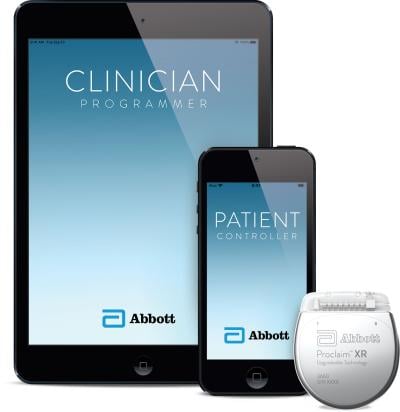Though designed to be a help, the “MRI mode” feature on many of Abbott’s implanted neuromodulation systems may turn out to be something of a hindrance for some users.
Abbott issued an urgent medical device correction in July after receiving reports that some devices would not turn back on after exiting MRI mode—which is meant to only temporarily disable therapy during an imaging scan—and this week, the FDA gave the issue a Class I rating, the agency’s most serious.
The recall—which clarifies user instructions and recommendations for the use of MRI mode, rather than requesting that any of the devices be returned to Abbott—covers more than 197,000 Proclaim and Infinity neurostimulation systems, according to a series of entries in the FDA’s recall database.
The affected Proclaim devices include the XR, Elite and Plus models of spinal cord stimulators and a dorsal root ganglion stimulator, while the Infinity system is a deep brain stimulator that targets Parkinson’s disease, essential tremor and other movement disorders.

According to a letter (PDF) Abbott sent to healthcare provider customers in July, some users submitted complaints describing how they’d been unable to resume neuromodulation therapy after a stint in MRI mode. These incidents occurred when the implantable pulse generator (IPG) had lost communication with the Patient Controller app, which is installed on either a user’s own Apple device or one provided by Abbott.
The company attributed the lost connections to instances where a user deleted the Bluetooth pairing between the app and IPG, lost or disabled the app or upgraded the iOS software on the Apple device while the IPG was in MRI mode.
If a user isn’t able to access the Patient Controller that was previously paired with their IPG, they won’t be able to exit MRI mode, therefore preventing their neuromodulation therapy from resuming. In those cases, surgery will be needed to remove the old IPG and implant one that can be connected anew to a Patient Controller.
Abbott didn’t disclose the exact number of complaints it’s received related to the issue, nor whether any associated injuries or patient deaths have occurred. However, it noted in the letter that the issue’s incidence rate was hovering around 0.06% of all of the devices distributed around the world, about half of which required additional surgeries to correct.
Since receiving the complaints, Abbott has not only updated the devices’ instructions for use but also added a note to the Patient Controller app’s screen while it’s in MRI mode to remind patients not to delete the Bluetooth pairing between the app and implant.
The devicemaker recommended that physicians also remind their patients not to break the Bluetooth connection, nor to alter, damage or lose the Patient Controller while the device is in MRI mode. They should also ensure that patients have updated the app’s software to its latest version before entering the scan-safe mode. Meanwhile, they should be careful not to alter their own connections with their patients’ IPGs—via the Clinician Programmer app—by maintaining Bluetooth pairings and disabling any automatic software updates that may take place while a device is in MRI mode.
“Abbott is committed to providing the highest quality products and support,” the company’s letter concluded. “We apologize for any inconvenience this may cause you and your patients, and we appreciate your support in ensuring patient safety and customer satisfaction.”